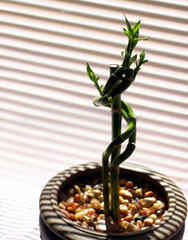Feng Shui: Tips For Your Home
Pronounced “fung-schway”, feng shui is the ancient Chinese art of arranging your living space in order to achieve harmony
with nature and the environment. When directly translated from Chinese, feng shui means "wind and water". The soft wind and
smooth running water refers to the association of good health, while harsh winds and rippled water are considered to be the
opposite. Feng shui aims at achieving harmony with the wind and water in order to promote health and well-being.
Although interior decorators have used the principles of feng shui in their design projects, feng shui is not a
decorating discipline. It’s a scientific approach to unblocking your environment and arranging your surroundings in
such a way that they allow free flowing movement and are able to attract chi, which is the Chinese word meaning
energy.
 |
Feng shui your home and increase the flow of energy. |
|
You can use the art of feng shui to decorate your living space and promote a positive atmosphere within your home. The
best way to go about this is to hire a feng shui consultant who is educated in this approach. They are trained to look for
and identify both the visible and invisible energy that is present within your home. Alternatively you can purchase one of
many feng shui books that will guide you on the right path. Below are a few general guidelines:
When sitting at a desk or lying in bed, the entrance door should be in a clear line of sight, and you should
have a view of as much of the room as possible. Straight lines and sharp corners are to be avoided, and especially should not point where people
tend to sit, stand, or sleep. Avoid clutter. Some objects, such as mirrors and crystals, are believed to have the power of redirecting,
reflecting, or shifting energy in a space.
Author: Dimi Ingle
Copyright: Remedium. This article may not be copied, in whole or in part, without the written consent of Remedium.
|